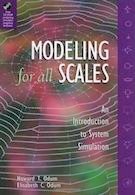All manner of models are used to describe, simulate, extrapolate,
and ultimately understand the function of dynamic systems.
These sorts of models are usually based upon a mathematical foundation
that can be difficult to manipulate especially for students.
Modeling for all Scales uses object-oriented programming
to erect and evaluate the efficacy of models of small-, intermediate- and large scale systems.
Such models allow users to employ intuitively based symbols and a systems ecology approach.
The authors, leaders in the systems ecology community,
have originated much of the scientific vocabulary of the field.
After an introduction to modeling and its benefits,
several chapters detailing the more particular elements of successful simulation
are followed by another series of chapters, each devoted to models of different sorts of systems.
Small-scale models of growth, competition, and evolution
give way, successively, to larger and larger scale models
such as international trade and the global geobiosphere.
Anyone interested in an easy-to-use approach to modeling complex systems
authored by perhaps the most original systems ecologists of the century will want this book.
